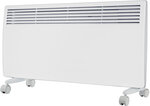Cheapest I have seen today at Costco for $119.99. Closest other cheap deal is for $129 @ Kogan.
Levante 2000W Panel Heater With Wifi (NDM-20WT) https://www.kogan.com/au/buy/levante-2000w-panel-heater-with…
This product features:
child lock
Hi-Lo power selection
open window detection
Wi-Fi enabled
24 hour timer
IP24 rated for use in wet areas
5 year Replacement Warranty.


2000 watt, I bet thats cheap to run :o